Deal or No Deal (Cruise Ship Version)
On September 29, 2023, while cruising on the Celebrity Reflection, I participated in a game show inspired by 'Deal or No Deal'. I captured numerous photos and saved one of the game cards for later review. This newsletter serves as my detailed examination of that experience.
On the day of the event, each game card was priced at $15. However, there was a promotional offer to acquire four cards for $50, which brought the average cost down to $12.50 each, presenting a minor saving. I remember there was a special offer for early card purchases before boarding, though I can't recall the specifics. Unsure of the game's potential value and suspecting it might have a low expected value, I deferred buying my cards until the event day, driven more by the fun of the experience than by competitive spirit.
The game unfolded in two distinct segments. During each segment, a card was selected randomly and electronically from those in play, and the holder of that card was then invited to the stage to participate.
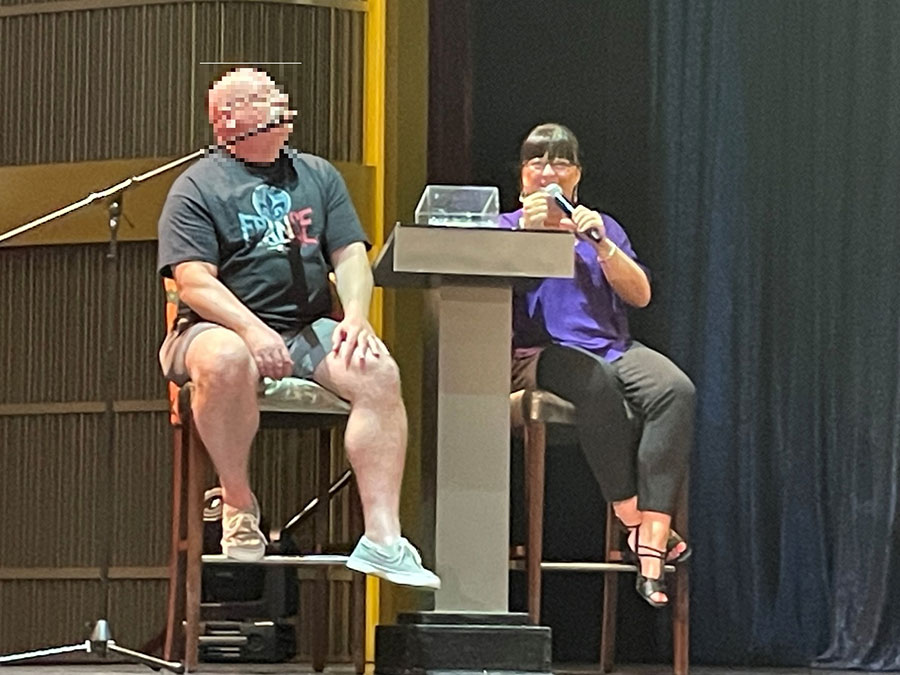
The image above features Angela, the cruise director, alongside the fortunate contestant from the first game.
The cruise ship's game mirrored the TV format closely; however, it had 20 cases rather than 26 and featured smaller prizes. The Banker's offers were around 90% of the calculated average value of the unopened cases.
Interestingly, there was a secretive banker figure, who I recognized as a staff member that occasionally substitutes for Angela the cruise director.
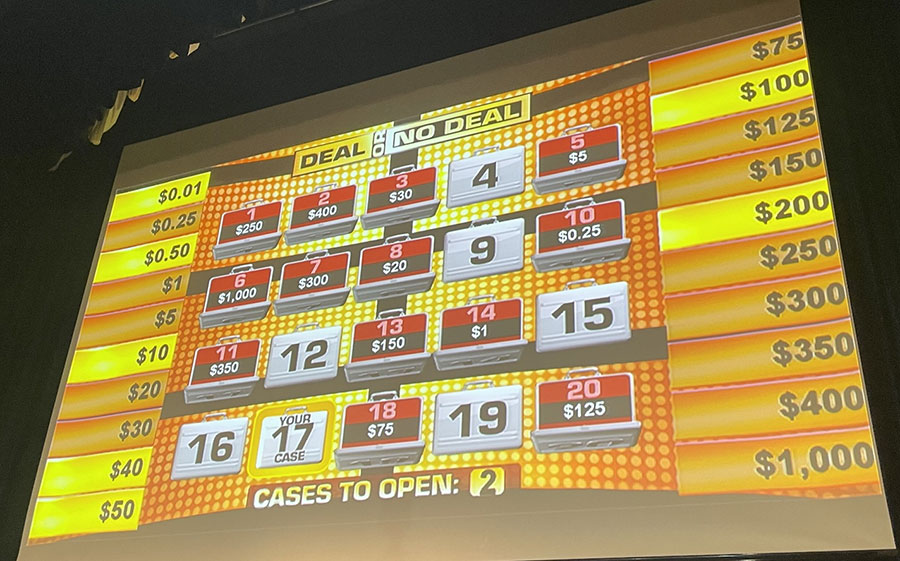
The above image captures a moment from the game, with lit amounts on either side representing prizes still in play, while the remaining amounts were located in cases that had already been opened.
After the main game concluded, the same contestant had the chance to spin the Banker’s Wheel. I was informed that this wheel was fair, providing a 50% chance of winning a complimentary cruise. The other half consisted of casino match play chips valued at $25, $50, $100, or $250. There was no further clarification regarding the cruise prize’s type or worth. The small print indicated that if a free cruise was awarded, various details like itinerary and accommodations were at the cruise line's discretion, excluding airfare, transfers, and any applicable fees. Having won several cruises in Las Vegas, I can assert that they typically come with the basic cabin level and restrict popular dates.
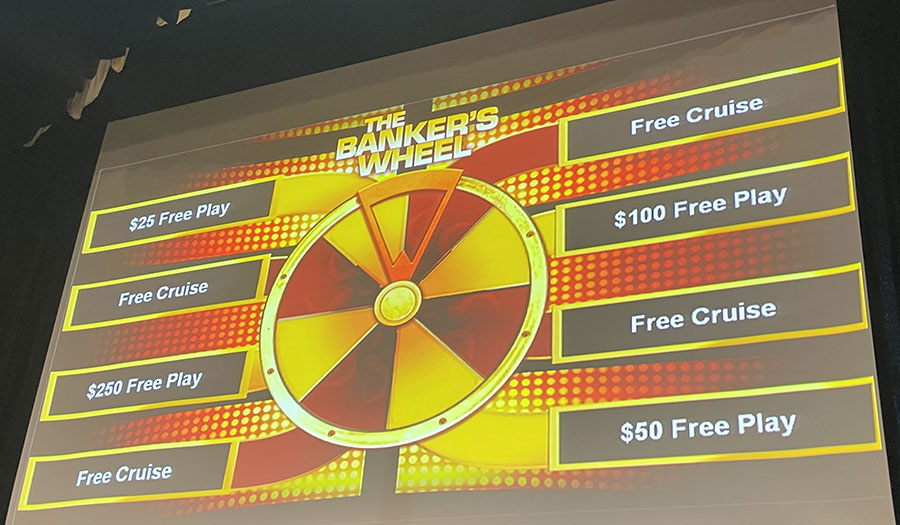
The image above showcases the Banker’s Wheel.
In addition, each game card had an opportunity to win consolation prizes. These cards included 20 cases, with potential prizes shuffled randomly behind flap covers. The audience members were spared the task of opening cases and tracking scores, as the computer managed all prize locations and card ownership. After each set of case openings, the screen displayed players vying for prizes.
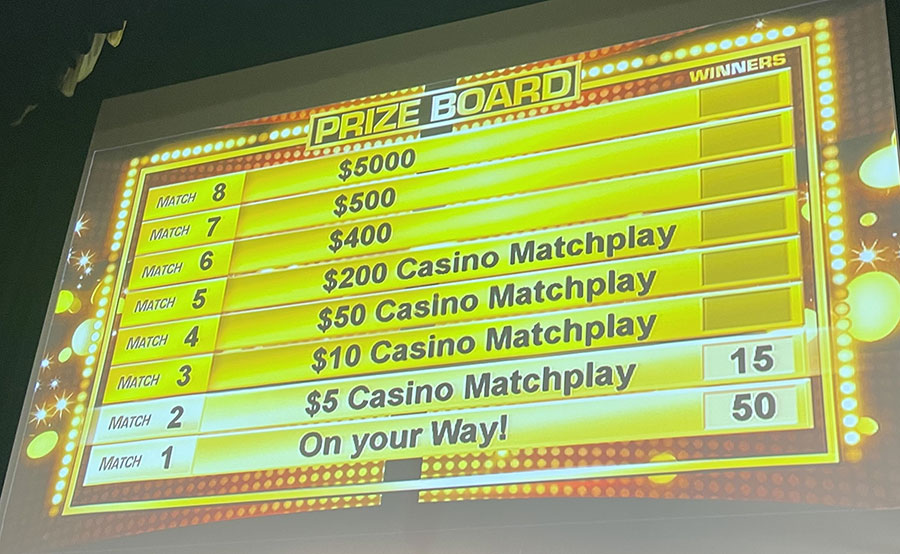
The image above illustrates the consolation prizes based on how many matches there were between the player’s card and the prize distribution during the game. At this point in the game, 50 cards had secured one match, while 15 cards had achieved two matches.
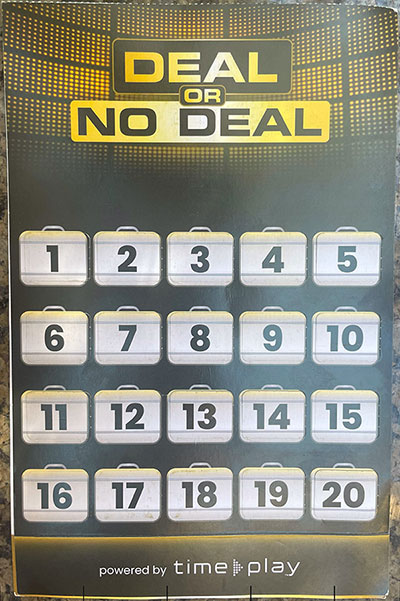
The image above depicts a standard game card. Each case had a flap revealing one of the 20 potential prizes.
My evaluation of the game hinges on some missing details, primarily the count of competing cards and the cruise's value.
It's straightforward to deduce that the average value of the cases is $155.33. This figure represents the base game's worth if a player never accepts a below-value offer from the banker. I broadly estimate there were around 300 cards in play. That leads to a per card game value of $155.30 divided by 300, approximately 4.14 cents.
To assess the Banker’s Wheel, understanding the cruise's value is essential. Assuming a generous estimation of the cruise valued at $2,000 and considering the casino match play values, the worth of that portion of the game amounts to $1,053.13, which is notably higher than the basic game figures. Dividing this by the estimated 300 cards gives a per card value of 28.08 cents.
Examining the consolation prizes relative to matching prizes on the play cards poses a classic problem in probability, often referred to as the Secret Santa dilemma. It originates from office gift exchanges where individuals are randomly assigned gift recipients. The frequent question examines the likelihood of people drawing their own names. In our scenario, we need to evaluate the chances of having between 2 to 20 matches.
Delving into the precise probabilities surpasses the remit of this newsletter. I might consider writing a follow-up piece on that topic eventually (though it’s uncertain). For now, we’ll operate on estimates that should be relatively accurate. If you're curious about the detailed mathematics, it has been discussed in my forum at. Wizard of Vegas
The following table provides my estimated probabilities for achieving two or more matches, the corresponding prizes, and the anticipated winnings for each scenario. The bottom right cell indicates an expected win of $3.20 per card per game.
| Matches | Probability | Win | Return |
| 8 or more | 0.000010 | $ 5,000 | $ 0.05 |
| 7 | 0.000073 | $ 500 | $ 0.04 |
| 6 | 0.000511 | $ 400 | $ 0.20 |
| 5 | 0.003066 | $ 200 | $ 0.61 |
| 4 | 0.015328 | $ 50 | $ 0.77 |
| 3 | 0.061313 | $ 10 | $ 0.61 |
| 2 | 0.183940 | $ 5 | $ 0.92 |
| 1 | 0.367879 | $ - | $ - |
| 0 | 0.367879 | $ - | $ - |
| Total | 1.000000 | $ 3.20 |
To recap, I calculated a base game value of $0.04, $0.28 for the Dealer’s Wheel, and $3.53 from the consolation prizes, combining for a total of $3.53. Remember, two games were played, doubling the expected win to $7.06. Given the price of $12.50 per card (buying four for $50), the expected return comes to 56.48%. This translates to a house edge of 43.52%. If there were any participants who did not show up, the overall value could potentially rise. However, since the consolation prizes hold the bulk of the value, the total number of cards in play is less impactful on the game's intrinsic worth.
Angela mentioned that the free play credits wouldn't be applied for a few hours post-show, advising for inquiries at the concierge about it. I suspect not many passengers followed up, as it was the final full day of the cruise. I didn’t check whether I had won any free play, even though my name was not listed as being in contention towards the end of either game.
I also want to point out that the same individual was invited to participate in both games! The second time, he opted to send his wife in his place. I later inquired about how many cards he had in play, to which he replied five.
Overall, the production of the game was executed excellently. Host Angela did a fantastic job. I thoroughly enjoyed the event, and I believe my companion and Mrs. Wizard did too. Would I participate in this game again? Most likely not, although being a game show enthusiast, it was worth experiencing once, even if the offered value resembles that of a lottery ticket.
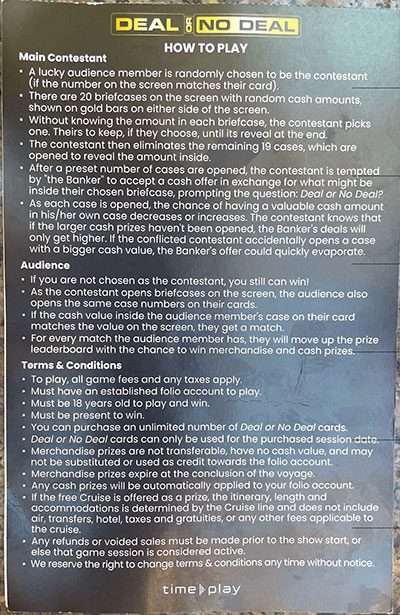
The image above shows the full rules.
For more information, visit Timeplay.com Creators of this and other multiplayer games designed for cruise entertainment.


